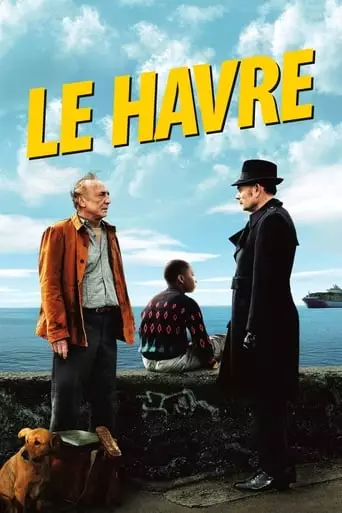
Le Havre (2011) Watch Online Free
In the French harbor city of Le Havre, fate throws young African refugee Idrissa into the path of Marcel Marx, a well-spoken bohemian who works as a shoe-shiner. With innate optimism and the tireless support of his community, Marcel stands up to officials pursuing the boy for deportation.
Le Havre is a French film directed by Aki Kaurismäki, known for his distinct, deadpan style. The story follows Marcel Marx, a shoe shiner in the port city of Le Havre, France, who becomes involved in helping an African boy named Idrissa, an illegal immigrant who escapes from a shipping container. Marcel’s wife, Arletty, is seriously ill and hospitalized, and during this challenging time, Marcel becomes a protector and father figure to Idrissa, who is trying to reunite with his mother in England.
Marcel, with the help of his neighbors, including a local baker, a bar owner, and even a rock star, organizes a charity concert to raise money for Idrissa’s escape. Meanwhile, the police, led by Detective Monet, relentlessly pursue the boy. The film blends humor, social commentary, and a fairy-tale-like optimism in a simple, yet profound narrative.
Le Havre explores themes of immigration, community solidarity, and the human desire for connection. It offers a gentle critique of the bureaucratic and often harsh realities of modern life, especially concerning the treatment of refugees and immigrants. While the film doesn’t delve deeply into the complexities of immigration policies, it presents a hopeful and idealistic vision of a society where compassion and kindness can overcome systemic injustice. Marcel’s selflessness and the support he receives from his community highlight the power of collective action in the face of adversity.
The film’s visual style, with its muted colors and retro aesthetic, evokes a sense of nostalgia for a simpler time, while also subtly commenting on the modern world’s disconnection. Marcel’s stoic demeanor and the film’s slow pace contribute to its melancholic yet warm tone. The juxtaposition of the small, tight-knit community with the vastness of the world’s problems creates a unique dynamic that makes the film feel both intimate and universal.
Le Havre had a significant impact on audiences and critics, earning praise for its emotional depth and simplicity. The film’s optimistic portrayal of humanity in the face of immigration crises resonated strongly with contemporary political issues, especially in Europe, where immigration remains a hot-button topic. Kaurismäki’s decision to set the film in a working-class neighborhood, where the protagonists’ struggles are met with compassion rather than judgment, offered a refreshing perspective in a time of rising nationalism and anti-immigrant sentiment.
The film’s success also helped cement Kaurismäki’s reputation as a master of minimalist cinema, capable of telling complex stories with subtlety and humor. The film’s international acclaim, including a nomination for the Palme d’Or at the Cannes Film Festival, highlighted the universal appeal of its themes.
After watching Le Havre, you will likely feel a mix of warmth and reflection. The film’s hopeful message about human kindness in the face of adversity will leave you feeling uplifted, while its portrayal of the challenges faced by immigrants may provoke thought about the current state of global politics. The simplicity of the film, combined with its emotional depth, creates a lasting impression that lingers long after the credits roll. You may also appreciate the beauty in the small, everyday acts of kindness that the film so gently celebrates, leaving you with a renewed sense of optimism about the power of community and compassion.
Le Havre is a film that offers a quiet yet profound commentary on the world, and its timeless themes ensure that it resonates with viewers of all ages and backgrounds
